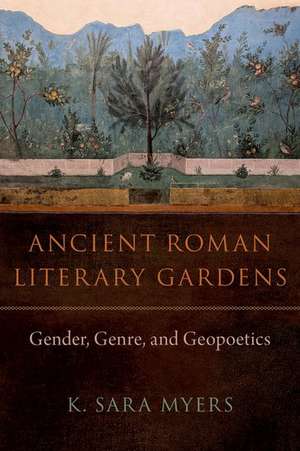Ancient Roman Literary Gardens: Gender, Genre, and Geopoetics
Autor K. Sara Myersen Limba Engleză Hardback – 23 dec 2024
Preț: 372.74 lei
Preț vechi: 511.78 lei
-27% Nou
Puncte Express: 559
Preț estimativ în valută:
71.32€ • 74.66$ • 59.36£
71.32€ • 74.66$ • 59.36£
Carte disponibilă
Livrare economică 27 februarie-05 martie
Preluare comenzi: 021 569.72.76
Specificații
ISBN-13: 9780197773208
ISBN-10: 0197773206
Pagini: 312
Dimensiuni: 164 x 237 x 25 mm
Greutate: 0.6 kg
Editura: Oxford University Press
Colecția OUP USA
Locul publicării:New York, United States
ISBN-10: 0197773206
Pagini: 312
Dimensiuni: 164 x 237 x 25 mm
Greutate: 0.6 kg
Editura: Oxford University Press
Colecția OUP USA
Locul publicării:New York, United States
Recenzii
This attractive book treats the rich topic of gardens, a significant theme in Latin literature, and illumines some key central texts with acute and rewarding analysis; its interests in gender, genre, and garden studies also make it impressively contemporary and interdisciplinary.
This important literary and geopolitical study moves the Roman garden as reflected in works of literature from the cultural margins to the center stage of classical studies. Myers shows how the garden cuts across all major Roman literary genres and contributes to current critical thinking about space, gender, ethics, and politics. In an abundant series of innovative readings of Roman texts extending over three centuries, Myers explores the paradoxes and the generic tensions of Roman gardens as sites of old-fashioned virtue and decadent luxury, of philosophical retreat and political engagement, of female submission and female mastery. Ancient Roman Literary Gardens makes a major contribution to Roman literary and cultural studies.
This important literary and geopolitical study moves the Roman garden as reflected in works of literature from the cultural margins to the center stage of classical studies. Myers shows how the garden cuts across all major Roman literary genres and contributes to current critical thinking about space, gender, ethics, and politics. In an abundant series of innovative readings of Roman texts extending over three centuries, Myers explores the paradoxes and the generic tensions of Roman gardens as sites of old-fashioned virtue and decadent luxury, of philosophical retreat and political engagement, of female submission and female mastery. Ancient Roman Literary Gardens makes a major contribution to Roman literary and cultural studies.
Notă biografică
K. Sara Myers is Professor of Classics at the University of Virginia and the author of Ovid's Causes and a commentary on Ovid's Metamorphoses 14.
